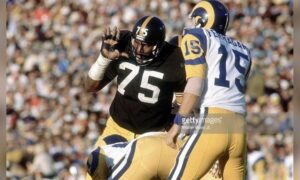By Matthew Marczi
The signs all seem to be pointing toward rookie linebacker Vince Williams edging ever closer to being anointed the starter for the Pittsburgh Steelers, which could happen as early as this Sunday in London against the Minnesota Vikings. He is certainly not worrying himself over it, however.
Even though he has played twice the number of snaps that Kion Wilson—the starter by title—has played over the last two weeks; even though he has been the one taking the first-team reps in practice this week: Williams is still not taking it for granted.
Nor has he taken anything for granted since he’s gotten here. He spent the offseason learning both inside linebacker positions knowing that an injury could arise on any occasion to afford an opportunity for another player.
One could say that happened during the preseason when Stevenson Sylvester was injured due to friendly fire, which afforded Williams a greater opportunity to showcase his natural ability and his growth as a coverage linebacker, which was a potential concern for him coming out of college.
The season-ending injury to Larry Foote, of course, was the biggest opportunity of all, as unfortunate as it may be. Odds are we would not be discussing Vince Williams much at all, who spent Week One on the inactive list, had the veteran linebacker not ruptured his bicep in the season opener.
That injury once again afforded Williams the opportunity to showcase his growth and development on the field. Of course, it has come with more growing pains now that he is consistently playing against starter-caliber talent.
One of the things that Williams has discussed struggling with—which is no surprise—is the speed of the game. Every rookie seemingly talks about the speed of the game and how much faster it is than in college, or even in the preseason, but some things are clichés for a good reason.
One thing that he has not struggled with, however, is embracing his quasi-leadership role on defense as the signal caller. He was the defensive leader in college, after all, so it was an easier transition. As he told Ed Bouchette:
I was really comfortable making the calls. The hard part was getting used to how fast things move in the NFL, the motions, the shifts, those adjustments. Understanding the defense, I felt like that was something I could go home and do. I went home and got in the playbook and went over my assignments. I’d go in the mirror and sound out my calls so when I communicated them they would come out smooth.
Being comfortable in the defense has generally been the greatest impediment for rookies on the Steelers to earn playing time on defense, but Williams is a heady player, and seems to be grasping things rather well, which is why the team is trusting him with so much responsibility. And if his biggest problem is adjusting to the speed of the game, what better way than for him to play at that speed himself?





